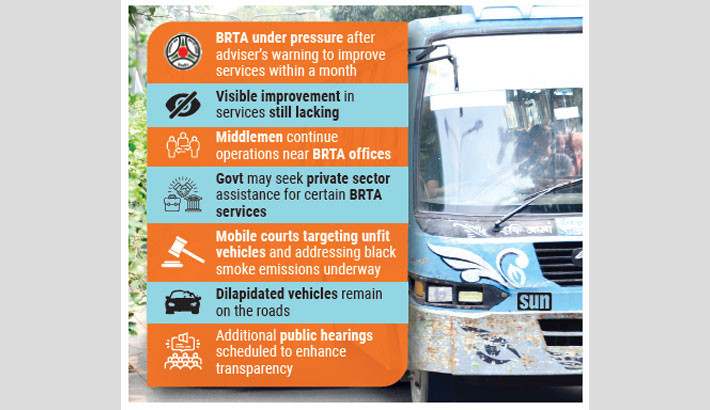
The Bangladesh Road Transport Authority (BRTA) has ramped up efforts to enhance services and address inefficiencies after receiving a strict warning from the road transport and bridges adviser, who cautioned that failure to show progress within a month could result in action against all levels of its officials and employees, including the chairman.
Despite the flurry of activity, unfit and dilapidated vehicles are still seen on the roads, and middlemen continue to operate near BRTA’s Mirpur office. As yet, there has been no visible improvement in service delivery.
When asked about the matter, Mohammed Yasin, chairman (Grade-1) of the BRTA, told the Daily Sun, “We are working to improve service quality. Several initiatives have been taken, including conducting regular mobile courts. We are implementing these measures and hope to see improvements soon.”
An investigation into BRTA’s actions following the adviser’s warning reveals a mix of routine activities and new initiatives. BRTA has announced that metro and district circles will remain open on Saturdays to ensure uninterrupted customer service.
Additionally, measures have been taken to ensure the constant presence of members of the driving licence competency assessment committee during Driving Licence Board sessions.
Mobile courts, led by BRTA executive magistrates, are in operation to curb the influence of middlemen in offices and address various irregularities in issuing licences, fitness certificates, registration renewals, and other services.
On the highways, efforts have been made to restrict the movement of three-wheelers, autorickshaws, auto-tempos, and non-mechanised vehicles. To improve transparency and public engagement, metro and district circles will hold public hearings twice a month.
Executive magistrates have been tasked with specific mobile court duties, with detailed duty rosters being developed. Monthly reports from these courts are compiled and shared via press releases. BRTA is also providing financial assistance to the families of victims of road accidents through its trustee board.
In coordination with the Department of Environment, BRTA is targeting vehicles that emit black smoke, using portable smoke opacity meters and gas analysers to identify violators.
Plans are underway to remove unfit and outdated vehicles without route permits, including buses, minibuses, trucks, and covered vans, from Dhaka city.
When asked about possible consequences if BRTA fails to improve its services within the stipulated time, Adviser Muhammad Fouzul Kabir Khan commented, “Vehicle fitness standards must be enforced effectively. If a vehicle is certified fit, how can it still emit black smoke? We may involve garages with advanced equipment for certification. The transport sector cannot be left entirely to BRTA – it has its limitations and corruption issues. The government will do whatever is necessary. We won’t allow public institutions to hold people hostage.”
Several BRTA officials, speaking on condition of anonymity, acknowledged the organisation’s shortcoming.
The BRTA faces numerous challenges, including manpower shortages, they noted, adding that without adequate personnel, how can we provide efficient service?
They further said that transport owners exert undue influence, and the government is often complicit. This limits BRTA’s capacity. Furthermore, some officials lack the right mindset for public service. Amidst these difficulties, there are conspiracies to involve third parties in BRTA operations.


